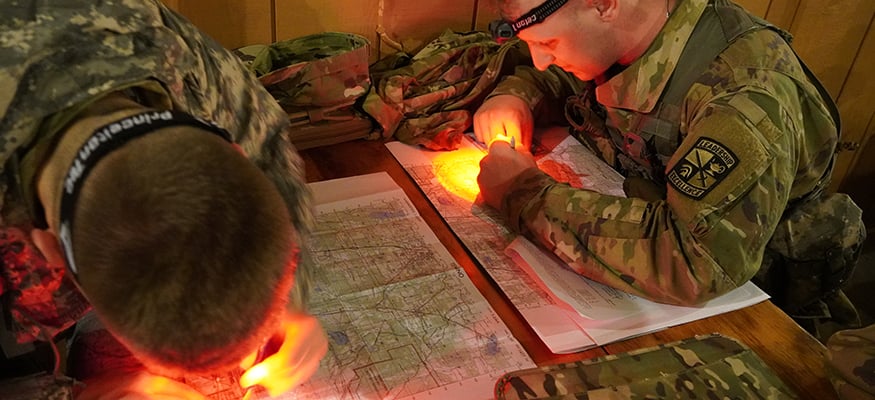

Air Assault
U.S. Army Air Assault School is a 10-day course designed to prepare Soldiers for insertion, evacuation, and pathfinder missions that call for the use of multipurpose transportation and assault helicopters. Air Assault training focuses on the mastery of rappelling techniques and sling load procedures, skills that involve intense conentration and a commitment to safety and preparation. Training is broken into three phases, each lasting three days: Combat Assault Phase, Sling Load Phase, and Rappel Phase. On graduation day, Cadets will undergo a 12-mile rucksack march. When they complete the march, they willearn their wings as offical Air Assault Soldiers.
Full Story + Show Less –Airborne School
Becoming a paratrooper at Airborne School is a unique experience requiring special dedication and a desire to be challenged mentally and physically. This three-week course, also known as Basic Airborne Course, teaches Soldiers the techniques involved in parachuting from airplanes and landing safely. The final test includes a non-assisted jump.
The purpose of the BAC is to qualify the volunteer in the use of the parachute as a means of combat deployment and to develop leadership, self-confidence, and an aggressive spirit through mental and physical conditioning.
Full Story + Show Less –Ranger Challenge
The Ranger Challenge Team is a Maverick Battalion sponsored extra-curricular group. Its mainfocus points are leadership development, military skill training, and physical excellence. The Maverick Battalion's Ranger Challenge Team is given the opportunity to complete annually in the fall semester 3rd Brigade Ranger Challenge Competition which tests mental fortitude and agility, military skills proficiency, and personal fitness. The Maverick Battalion trains one team of eleven cadets (nine primary, two alternate) to represent Minnesota State University, Mankato in this challenging event. A typical week for the Maverick Battalion Ranger Challenge Team involves physical training Monday-Friday mornings, as well as, military skills training two afternoons during the week.
Full Story + Show Less –KU Ranger Buddy Competition
The Maverick Battalion is represented with two-person teams (upto 5 male, 3 coed, and 2 female teams). Hosted at Kansas University, our teams compete against two-person teams from 35 colleges and universities in 12 states. They participate in a series of challenges requiring physical skills, individual movement techniques, first aid tasks, weapons tasks, knowledge of knots, military reporting formats and more.
Full Story + Show Less –Army Ten Miler
A group of six Cadets are selected to represent the Maverick Battalion at the Army Ten Miler race in Washington D.C. in the fall. The Cadets are selected by time and merit, flown out to Washington D.C. for 3-4 days to tour the city, its history and attractions. On the final day, the team competes in a scenic ten mile run of Washington D.C.
Full Story + Show Less –Bataan Memorial Death March
The Bataan Memorial Death March is a challenging 26.2 mile team race through the high desert terrain of White Sands Missile Range, conducted in honor of the heroic service members who defended the Philippine Islands during World War II, sacrificing their freedom, health and, in many cases, their very lives. A team of five is selected to represent the Maverick Battalion at White Sands, New Mexico.
Full Story + Show Less –Color Guard
Cadets who participate in the Maverick Battalion Color Guard have the special opportunity to play a central role in many events such as the annual Homecoming Parade, Veterans Day Ceremonies, the annual MSU ROTC Military Ball and multiple home NCAA sporting events for football, men’s and women’s basketball, ice hockey, and others. Cadets train hard every week in order to carry out their missions in an organized, professional manner in any location at any time. The Color Guard’s role is highly crucial in all these events and are complimentary to the MSU Marching Band in honoring America with the “Star Spangled Banner.”
Full Story + Show Less –The Cadet Professional Development Training (CPDT) program provides Cadets with optional summer training opportunities during summer, winter and spring breaks. CPDT is further broken down into five sections: Cadet Practical Field Training (CPFT) and Cadet Troop Leader Training (CTLT).

